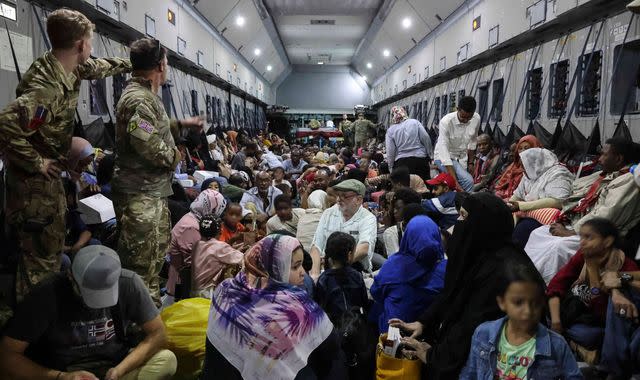The latest numbers of reported casualties are 528 dead and 4,620 injured. Streets in some Sudan cities returned to relative calm on Sunday as a shaky ceasefire helped scale back a conflict that has left hundreds dead in the past two weeks.
Police have been deployed to maintain order in Khartoum and Omdurman, eyewitnesses reported, although there are continued reports of looting and sporadic gunfire, according to a journalist in Khartoum.
Clashes continued over the weekend despite the calling of a 72-hour ceasefire on Thursday, with both sides accusing the other of violating the agreement.
Both Sudan’s Armed Forces and the Rapid Support Forces (RSF) paramilitary group said they would extend a “humanitarian truce” for another 72 hours from midnight (22:00 GMT).
The RSF group’s spokesman said it was responding to international and local calls “to open humanitarian corridors” and allow civilians to “reach safe areas.”
The armed forces said the extended ceasefire was “based on the efforts of (an) American-Saudi mediation request.”
According to the World Health Organisation (WHO), the latest numbers of casualties reported by the Sudanese Ministry of Health were 528 dead and 4,620 injured since fighting broke out on April 15, although the real toll is believed to be much higher.
The humanitarian situation in Sudan was “reaching breaking point,” the UN’s emergency relief coordinator Martin Griffiths said in a statement.
Goods essential for people’s survival were becoming scarce in the hardest-hit urban centers, especially Khartoum, and families were struggling to access water, food, fuel, medical care, and other critical commodities, Griffiths said.
The United Nations and its partners were “doing our best to reboot the humanitarian response” in the country, he said.
“Massive looting of the offices and warehouses of humanitarian organizations has depleted most of our supplies.
“We are exploring urgent ways to bring in and distribute additional supplies.”
A shipment with five containers of intravenous fluids and other emergency supplies were docked in Port Sudan, awaiting clearance by authorities, he said.
“The scale and speed of what is unfolding in Sudan is unprecedented. We are extremely concerned by the immediate as well as long-term impact on all people in Sudan and the broader region.”
The International Committee of the Red Cross said on Sunday it had sent a plane of medical supplies to Port Sudan and a second plane with emergency personnel would follow.
Sudan’s de facto president, Abdel Fattah al-Burhan, has been locked in conflict with his deputy, Mohammed Hamdan Daglo, with the help of the country’s military since April 15. Daglo is the leader of the influential RSF.
The two generals took over the leadership of the country of about 46 million through two military coups in 2019 and 2021.
Read more: Airstrikes and artillery continue as Sudan war enters 3rd week
Thousands of people are still fleeing the country, state workers have been given indefinite leave and governments from across the world have launched evacuation missions to airlift their citizens to safety.
British officials, after officially ending their Sudanese evacuation mission, announced another flight to take people from the conflict-hit country on Monday after flying out 2,122 people.
Dutch officials meanwhile said they had completed their evacuation of at least 160 Dutch nationals from the country on Saturday evening, while Irish officials said they have now transported a total of 209 citizens out of Sudan.
The UN World Food Programme (WFP) has warned that the ongoing violence could plunge the entire region of East Africa into a humanitarian crisis.
“A third of the country’s population was starving even before the fighting broke out, now there is a shortage of everything and food prices are skyrocketing,” Martin Frick, the director of the WFP in Germany, told dpa.
Similar price increases are also occurring in neighboring Chad and South Sudan.
Read more: Sudan to Egypt: FG to pay visa fees for stranded Nigerians
Both countries have taken in thousands of refugees since the fighting began in Sudan two weeks ago.
“In South Sudan, which is facing flooding in some areas and droughts in others due to the climate crisis, food prices have risen by 28% in a very short time,” said Frick.
To make matters worse, six failed rainy seasons have resulted in record-high pressure on food supplies in the Horn of Africa.













